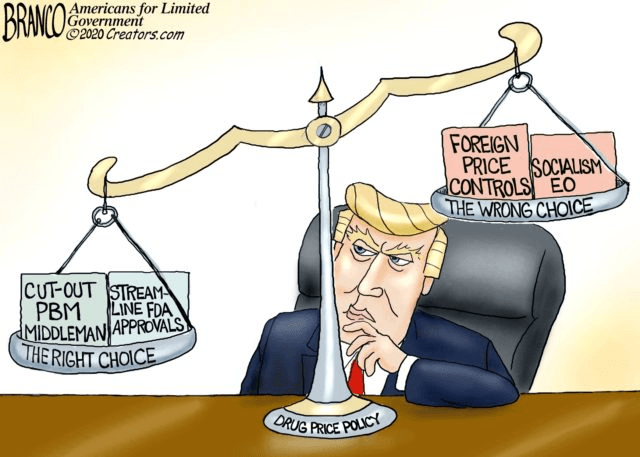The following article is sponsored by Americans for Limited Government and authored by Richard Manning.
Politicians have been promising to bring down drug prices for decades. President Trump is the first to actually follow through.
Now the president’s executive order cracking down on pharmaceutical drug middlemen, known as Pharmacy Benefit Managers (PBMs), will continue the fight to lower prices even more.
“I’m going to bring down drug prices. I don’t like what has happened with drug prices,” President Trump said in his 2016 interview with Time Magazine, which had named him Person of the Year.
Donald Trump, as we all know, is not like other politicians. He doesn’t bow down to the feckless media, or to the Democrats, or to the insider insurance lobbyists that have protected the plum deal the PBMs have had for decades.
So, it shouldn’t be surprising that, unlike the politicians who preceded him, Trump has actually gotten results when it comes to drug prices.
According to the Consumer Price Index, prescription drug prices in the United States dropped 2 percent from June 2018 to June 2019, which is the largest annual drop since 1967. In contrast, drug prices increased an average of 3.6 per year during President Obama’s eight years in office.
Meanwhile, average premiums for Medicare Part D prescription drug plans have decreased 13.5 percent since 2017. The cumulative savings to seniors? $1.9 billion.
Trump recently issued an executive order which will be crucial in putting money back in seniors’ pockets: an order forcing the massive PBMs to give the rebates they extract from their huge clout in the market directly to the consumers they’re supposed to be working for.
The order will “prohibit secret deals between drug manufacturers and pharmacy benefit manager middlemen, ensuring patients directly benefit from available discounts at the pharmacy counter,” as the White House explained in its announcement.
PBMs have perfected the art of negotiating drug costs between insurance and pharmacies at the consumer’s expense. The lack of any transparency for the deals PBMs make and the rebates they receive from drug manufacturers means America’s patients often do not realize that they are getting ripped off at the pharmacy counter. Meanwhile, in the last few years, the largest PBM companies have generated higher revenues than even the largest pharmaceutical companies.
In 2017, for example, “the top PBMs had revenues that exceeded those of the top pharmaceutical manufacturers,” with Express Scripts, one of the biggest PBMs, reporting revenue of $100 billion while a major drug company had revenues of $52 billion, a recent white paper found.
People who aren’t steeped in the political debate about health care often have no idea that the price they pay often has no relationship whatsoever to the price that was paid to supply that drug. Often times, PBMs negotiate up to 50 percent off from the price, but pass none of the savings on to you, the consumer.
PBMs employ a range of techniques to keep what’s really going on under wraps.
For instance, “gag clauses” are legal agreements to prevent pharmacists from telling customers about the availability of cheaper options.
And “clawbacks” are cases where PBMs negotiate that patients pay a higher copay than the drug actually costs, netting the difference to themselves. For example, a patient might be charged a $50 copay for a drug that costs $10. They could just buy it out of pocket for $40 less than the copay, but often the pharmacist is prevented from saying so.
One study at the University of Southern California found that 23 percent of drugs were subject to these clawbacks, with an average overpayment of $7.69.
It’s honestly highway robbery, made possible by loopholes in the law and an army of lawyers and lobbyists who work 24/7 to keep those loopholes intact.
But PBMs may have met their match in President Trump. This is a president who has had to negotiate with lots of different characters and has an almost magical ability to end up getting the better end of a bargain.
It’s about time someone stood up for everyday people. When PBMs negotiate a discount, it should end up in the pockets of the American consumers it purportedly benefits. Finally, in President Trump, we have a leader who not only talks the talk, but walks the walk.

COMMENTS
Please let us know if you're having issues with commenting.